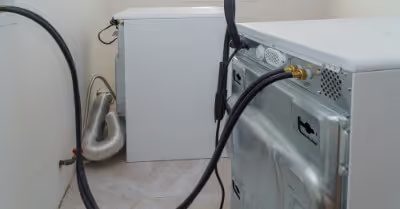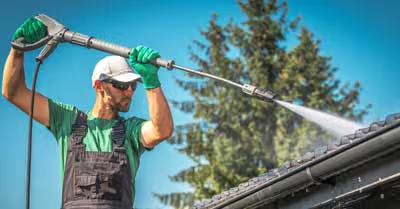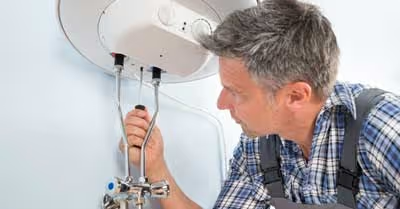Table of Contents
Why You Shouldn’t Use Chemical Drain Cleaner
Drain cleaners seem like a cheap and simple solution to your clogged drain woes. However, it is best to avoid them and select a natural solution instead.
Commercial liquid drain cleaners are extremely toxic. They can irritate your nose, eyes, or even your skin. Surely you don’t want to breathe in the fumes as you pour this toxic gunk down your kitchen sink.
If that isn’t reason enough to avoid commercial drain cleaners, there are other issues you need to know. Liquid drain cleaner often says it will clean your pipes while it is actually damaging them. Most brands contain hydrochloric acid that eats away at the pipe. It can also damage your countertops.
The environment also suffers from the use of chemical liquid drain cleaners. The bottles are plastic and the residue inside of them can poison fish, birds, and mammals.
So liquid drain cleaners are that bad? But they are an easy way to effectively clear a clogged drain, right? Not so fast. They are not always effective, and it is best to try other methods that don’t just eat away at the material in your drain.
What Causes Clogged Drains?
Lots of things can cause a clog in your drain, but you should have some primary suspects. These culprits cause more clogs in your sinks.
Food Pieces
Large food pieces clog drains so always make sure to use the disposal and water to flush them away. Even then, some food will cause clogs. Vegetable scraps, like potato and carrot peels, tend to be a major culprit in clogged drains.
Grease and Fat
Grease and fatty foods, like oils and butter, are major clog inducers. You wouldn’t think grease or butter would be such a clog risk since it is liquor, but when it cools it solidifies. This will coat the inside of the pipes which makes it easier for other substances to clog it.
Hair
Hair often clogs up a bathroom sink because it will easily flow down the drain, but then builds up over time.
Soap
Soap builds up along the insides of the pipes and can eventually block up the pipe. Sometimes this can actually begin to corrode and deteriorate the pipes.
How to Clear a Clogged Drain the Natural Way
There are several methods to unclog a drain, many of which you probably have the materials for in your home already. If one doesn’t work, it doesn’t hurt to keep trying to find the solution you need.
Plunger
A plunger can unclog your toilet, so why couldn’t it clear your clogged sink drain? To use it, you have to fill the sink about half full with water. Then use the plunger on the drain in the same way that you would in the toilet. It can splash water, so be careful and move anything that you don’t want to get wet.
Wire Hanger
This is a great way to remove or dislodge food, hair, or other major clogs. Just bend the end of the wire or hanger into a hook. It is best to use pliers so you have leverage. You should also wear gloves because it can be messy and gross. Slide the hook down into the drain and slowly pull up to remove clogs. Repeat until the drain is clear and water flows freely through the pipe.
Dish Soap and Hot Water
This is best to clear away clogs caused by fat, grease, or butter. The hot water will melt down the grease and the dish soap helps remove excess gunk and flows the solution easily down the pipes.
Just boil a large pot of water and add 3 to 4 tablespoons of dish soap. Pour it slowly down the drain and then wash it through with more warm water. It may take a few times, but if fat or grease is causing your clog, this is a great method to clear it.
Salt and Hot Water
The texture of the salt can help clear clogs made by soap or grease as the water will dissolve or melt the material blocking the pipe. Pour salt down the drain first. A fourth to a half cup should work. Then slowly pour hot water down the drain. Repeat as needed.
Wet/Dry Vacuum
Stubborn clogs can be removed using a wet/dry vacuum. It can suck out the blockage leaving you a clear pipe. Make sure you set the vacuum to the wet setting. Then you will have to create a seal between the vacuum tube and the drain. Turn it on and let it do its thing.
Enzyme Cleaner
You can purchase a biological cleaner if all else fails. It is still natural and uses enzymes to break down organic material. This will work on grease, hair, and even soap. Just follow the instructions!
Clean Trap
If none of the other methods work, you may just have to remove the trap, the u shaped piece of pipe under the sink. Place a bucket beneath it and use a plumber’s wrench to unscrew the nuts until you can remove the trap. Then, dump out the gunk. You may have to use a wire hanger or old toothbrush to force some of the material out. Rinse it out and screw it back into place.
How to Prevent Clogged Drains
There are some things you can do to prevent a clogged drain. You definitely want to do this after you clear the clog in your drain so that it doesn’t happen in the near future.
First of all, never put fats, oil, butter, or grease into your drain. Any food that has a high fat content will thicken and solidify when it cools. Pour it into the trash or other container instead.
It is also best to avoid putting excess food material into the sink. You should peel vegetables over the trash can. Don’t put egg shells into the sink either.
Hair is a major cause of clogged bathroom drains. You can buy a hair filter so that it doesn’t flow in. Then you can wipe away additional hair and throw it in the trash.
Last, it is best to regularly flush drains with hot salt water. This will prevent grease, oils, and fats from building up and clogging it so that it doesn’t become fully blocked.
Recent Articles
















